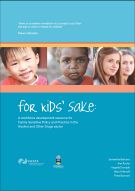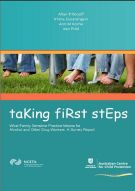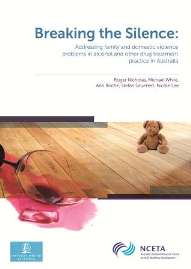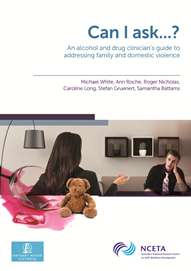Family Centred Practice in the Alcohol and Other Drug Field
What is Family Sensitive Policy and Practice?
Family senstive policy and practice involves raising awareness of the impact on substance abuse upon families, addressing the needs of families (Addaction, 2009, p.10) and seeing the family - rather than the individual adult or child - as the unit of intervention. It necessitates identifying and addressing the needs of adult clients as parents, as well as the needs of their children, as part of treatment and intervention processes, in order to ensure that as parents they are supported and child wellbeing and safety is maintained. The adoption of family sensitive policy and practices is paramount in the context of increasing:
- notifications and substantiations of child abuse and children placed in out of home care, and
- recognition of the relationship between alcohol and drug misuse, childhood and adolescent development, and child wellbeing and protection.
However, few programs consider the needs and development of children and adolescents, or provide for the care of children, whilst parent/s are in counselling or treatment programs.
There is growing impetus for a more comprehensive approach to understanding the causes, prevention and treatment of alcohol and other drugs problems across the alcohol and other drug and family and child welfare sectors. A holistic, public health approach is required to prevent the misuse of alcohol and other drugs in society and mitigate the impact of such misuse, especially the impact upon children and adolescents. While such a comprehensive approach encompasses a preventative focus to child abuse and neglect, it is important not to automatically associate parental substance misuse with harm to childre (Forrestor & Harwin, 2004). Rather parental substance misuse should be considered alongside a range of interrelated factors when determining impact.
NCETA's Program of Work
Due to the significant social harm derived from the impact of alcohol and other drug misuse on relationships, especially families and children, NCETA has developed a research program focussing on promoting child wellbeing and preventing child neglect. This research program was instigated in response to the release of the Australian Government report, Protecting Children is Everyone's Business: National Framework for Protecting Australia's Children 2009-2020. This framework identified parental drug and alcohol abuse as a key risk factor for child abuse and neglect, and highlighted scope for improvements in alcohol and other drug services through a greater focus on child and parent-sensitive practice.
Projects undertaken by NCETA include:
- collaborating with the Australian Centre for Child Protection to investigate the role of AOD workers and examine factors that influence family sensitive policy and practice in the alcohol and other drug treatment field. Results from this project were published in Taking First Steps. What family sensitive practice means for alcohol and other drug workers: A survey report.
- working with the Australian Infant, Child, Adolescent & Family Mental Health Association to produce a clinical supervision e-learning resource for COPMI. COPMI (Children of Parents with a Mental Illness) is a national initiative which develops information for parents, their partners, carers, family and friends in support of these children.
- a literature review examining the relationships between alcohol and other drug use and “family
and domestic violence” (FDV) in the context of AOD treatment settings. Breaking the Silence: Adressing family and domestic violence problems in alcohol and other drug treatment practice in Australia focuses on strategies that may be developed to enhance the responses of alcohol and other drug (AOD) treatment providers to FDV issues affecting clients and their children.
NCETA Resources
|
Battams, S., & Roche, A. (2011). Child welfare and protection concerns and the response of the alcohol and drugs sector in Australia. Advances in Mental Health, 10(1), 62-71.
|
|
 |
Battams, S., Roche, A.M., Duvnjak, A., Trifonoff, A., & Bywood, P. (2010). For Kids' Sake: A workforce development resource for Family Sensitive Policy and Practice in the alcohol and other drugs sector. Adelaide, SA: National Centre for Education and Training on Addiction, (NCETA) Flinders University. This resource kit also contains
|
|
|
Trifonoff, A., Duraisingam, V., Roche, A.M., & Pidd, K. (2010). Taking First Steps: What Family Sensitive Practice Means for Alcohol and Other Drug Workers: A Survey Report. Adelaide: National Centre for Education and Training on Addiction (NCETA), Flinders University. |
|
|
Nicholas, R., White, M., Roche, A.M., Gruenert, S., & Lee, N. (2012). Breaking the Silence: Addressing family and domestic violence problems in alcohol and other drug treatment practice in Australia. Adelaide, South Australia: National Centre for Education and Training on Addiction (NCETA), Flinders University. |
|
|
White, M., Roche, A., Nicholas, R., Long, C., Gruenert, S., & Battams, S. (2013). Can I Ask...? An alcohol and drug clinician’s guide to addressing family and domestic violence. Adelaide, South Australia: National Centre for Education and Training on Addiction (NCETA), Flinders University. |
 |
Family Drug Support, & National Centre for Education and Training in Addiction (NCETA) (2014). Walking a Tightrope. Alcohol and Other Drug Use and Violence: A Guide for Families. Adelaide, SA: Flinders University. Walking a Tightrope is a comprehensive resource for people who have a family member who uses both alcohol and other drugs (AOD) and violence in their relationships. The resource has been produced through a partnership between Family Drug Support (FDS) and NCETA. |
Other Resources
Australian Centre for Child Protection
Children of Parents with a Mental Illness (COPMI) national initiative www.copmi.net.au
COPMI training courses on child and family sensitive practice http://www.copmi.net.au/professionals/professional-tools/elearning-courses.html
Information Sharing Guidelines for promoting the safety and wellbeing of children, young people and their families: http://www.gcyp.sa.gov.au/wp-content/uploads/2009/09/INFORMATION-SHARING-GUIDELINES1.pdf


